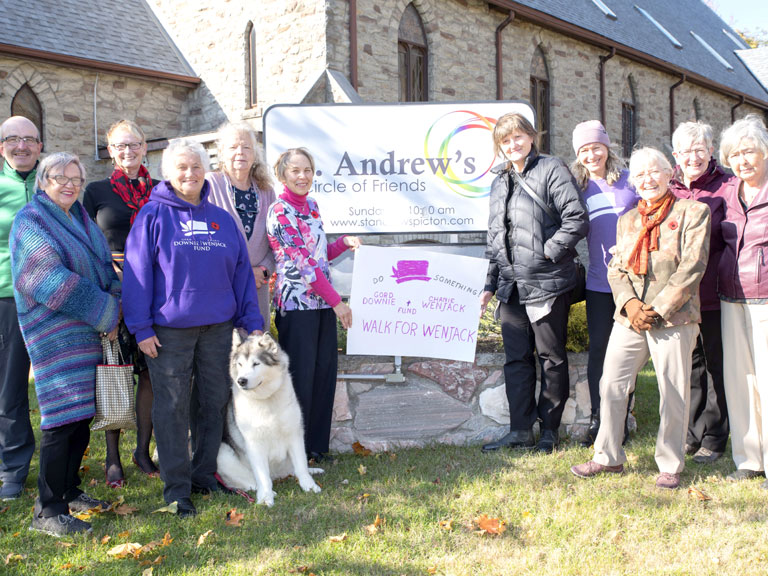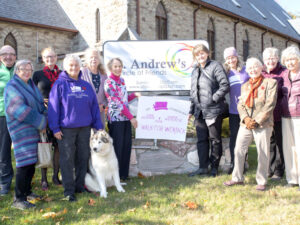County News
Walk for Wenjack

County teams raise over $6,000 towards reconciliation
Chanie Wenjack was just 12 years old when he died of exposure to the cold as he tried to make his way back to his northern Ontario home on October 22, 1966. He had been taken from his home in the Marten Falls First Nation to attend a residential school in Kenora, about 600 kilometres away. On October 16, 1966, he and two other boys decided to run away from the school. They made it to the boys’ uncle’s cabin about 20 miles away, a walk that took them about eight hours. Young Chanie stayed there for a few days before deciding to walk home. All he knew was that he had to follow the railway heading east. He set out unequipped for the weather, wearing just a light cotton windbreaker, and thirty-six hours later he was dead from the cold. This story haunted Gord Downie, and he wrote a series of 10 poems that were subsequently made into songs, resulting in an album called Secret Path, which acknowledges a dark part of Canadian history and has the goal of helping the country on a goal to reconciliation. Further to this, the Gord Downie and Chanie Wenjack Fund helped to establish almost 30 Legacy Rooms across the country, of which the room at the back of Lily’s Café in Picton was the first. These rooms contain a curated selection of books by Indigenous authors, as well as works of art, and are intended to serve as places to raise awareness of this neglected chapter of Canadian history, and a place where the journey of reconciliation can continue.

The St. Andrew’s Circle of Friends Walk for Wenjack team: (Front row, L-R): Jean Brinkos, Fran Renoy, Nakita (representing Andie Wiens), Jane Thompson, Anita Barnes, Mary Kay, Morris. (Back row, L-R): David Jacobs, Janice Ruggles-Bolton, Irene Camp, Bettina Braj, Karen Fuller, Sue Law. Absent: Marianne Gallagher and Susan Runnels.
The first Walk for Wenjack took place in 2016, retracing Chanie’s journey from the residential school to where he died beside the railroad tracks. This year, the Gord Downie and Chanie Wenjack Fund challenged people across the country to do their own Walk for Wenjack to “do something” to acknowledge the true impact of the residential school system. Karen Fuller heard about the challenge and decided to create a team of walkers in the County to help raise funds for the path to reconciliation. She grew up in the north, in Whitehorse, and says that about a third of her high school class were Indigenous students. She said they didn’t interact much with the other students, and mostly kept to themselves. “I saw a lot of things that I really couldn’t understand. I had no idea they were billeted, had to go away from their villages to come to high school.” In her career as an intensive care nurse in Thunder Bay, she also witnessed a great deal of hostility and prejudice towards Indigenous people. It was not until recently, in 2019, when a group at St. Andrew’s Presbyterian Church in Picton established a friendship with a group of people from the Tyendinaga Reserve and began reading some Indigenous literature, that Fuller began to comprehend a bit more of the history of the residential school system and its impact of the families and survivors. She felt that she was somehow complicit, that she had witnessed prejudice and ill-treatment and yet not done anything to combat it. After contacting Tyendinaga librarian Karen Lewis, Fuller and a small group enrolled in an online study course called Indigenous Canada offered by the University of Alberta. “Our eyes were opened. We were never taught these things in school. The way they were exploited, had many things denied them, and how they were deprived of the rights of other people,” she said.
It was during this course of study that Fuller came across the work of Gord Downie and became aware of the Walk for Wenjack. She sent a letter to various churches and organizations in the County, looking to create a team of walkers. The only other group that expressed interest was the County Arts Council. The St. Andrew’s team grew to 15 people, and together they walked a total of 650 kilometres. The team raised $4,997, second in Canada out of 198 other teams. A couple of the team members logged over 100 kilometres of walking during the period October 17 to October 22. One of them, Andie Weins, walked from Picton to Wellington on the Millennium Trail. She had expected the walk to take four hours, but it was closer to six hours as many people stopped to speak to her about the walking stick she was using. The stick was lent to her by Rick Byce, a Cree native, who carved it in memory of his father, a survivor of the residential school system who became the most highly decorated Indigenous veteran of the Second World War.
The County Arts Council team raised $1,225, helping the fund reach its total of $119,203, nearly doubling its goal of $60,000 and eclipsing last year’s total of $30,000. Fuller was grateful for all the support both County teams received. “The County is amazing for being first in terms of generosity. We were blown away by the support of people. Money was coming in from all over.” To learn more about the Downie & Wenjack Fund and Chanie’s story, please visit downiewenjack.ca.

Comments (0)